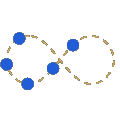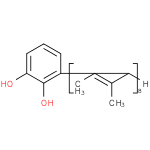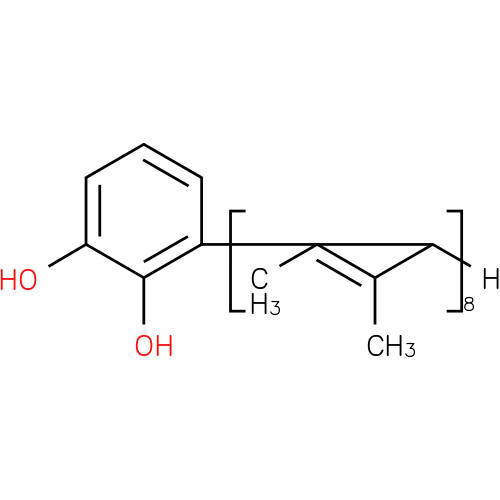|
Record Information |
|---|
| Version |
1.0 |
|---|
| Update Date |
1/22/2018 11:54:54 AM |
|---|
|
Metabolite ID | PAMDB110772 |
|---|
|
Identification |
|---|
| Name: |
3-(all-trans-octaprenyl)benzene-1,2-diol |
|---|
| Description: | A 3-(all-trans-polyprenyl)benzene-1,2-diol in which the substituent at position 3 is an all-trans-octaprenyl moiety. |
|---|
|
Structure |
|
|---|
| Synonyms: | -
2-octaprenyl-6-hydroxyphenol
|
|---|
|
Chemical Formula: |
C46H70O2
|
|---|
| Average Molecular Weight: |
655.06 |
|---|
| Monoisotopic Molecular
Weight: |
654.5375814912 |
|---|
| InChI Key: |
YNPGYMZVNLIZLD-BQFKTQOQSA-N |
|---|
| InChI: |
InChI=1S/C46H70O2/c1-36(2)18-10-19-37(3)20-11-21-38(4)22-12-23-39(5)24-13-25-40(6)26-14-27-41(7)28-15-29-42(8)30-16-31-43(9)34-35-44-32-17-33-45(47)46(44)48/h17-18,20,22,24,26,28,30,32-34,47-48H,10-16,19,21,23,25,27,29,31,35H2,1-9H3/b37-20+,38-22+,39-24+,40-26+,41-28+,42-30+,43-34+ |
|---|
| CAS
number: |
Not Available |
|---|
| IUPAC Name: | 3- [(2E,6E,10E,14E,18E,22E,26E)- [(2E,6E,10E,14E,18E,22E,26E)- 3,7,11,15,19,23,27,31- 3,7,11,15,19,23,27,31- octamethyldotriaconta- octamethyldotriaconta- 2,6,10,14,18,22,26,30- 2,6,10,14,18,22,26,30- octaen- octaen- 1- 1- yl]benzene- yl]benzene- 1,2- 1,2- diol diol |
|---|
|
Traditional IUPAC Name: |
Not Available |
|---|
| SMILES: | CC(=CCCC(=CCCC(=CCCC(=CCCC(=CCCC(=CCCC(=CCCC(=CCC1(C(O)=C(O)C=CC=1))C)C)C)C)C)C)C)C |
|---|
|
Chemical Taxonomy |
|---|
|
Taxonomy Description | This compound belongs to the class of organic compounds known as polyprenylbenzene-1,2-diols. These are compounds containing a polyisoprene chain attached to a catechol group. |
|---|
|
Kingdom |
Organic compounds |
|---|
| Super Class | Lipids and lipid-like molecules |
|---|
|
Class |
Prenol lipids |
|---|
| Sub Class | Polyprenylphenols |
|---|
|
Direct Parent |
Polyprenylbenzene-1,2-diols |
|---|
| Alternative Parents |
|
|---|
| Substituents |
- Tetraterpenoid
- Polyprenylbenzene-1,2-diol
- Catechol
- 1-hydroxy-4-unsubstituted benzenoid
- 1-hydroxy-2-unsubstituted benzenoid
- Phenol
- Benzenoid
- Monocyclic benzene moiety
- Organic oxygen compound
- Hydrocarbon derivative
- Organooxygen compound
- Aromatic homomonocyclic compound
|
|---|
| Molecular Framework |
Aromatic homomonocyclic compounds |
|---|
| External Descriptors |
- a 3-\u003ci\u003eall-trans\u003c/i\u003e-polyrenylbenzene-1,2-diol (2-OCTAPRENYL-6-HYDROXYPHENOL)
|
|---|
|
Physical Properties |
|---|
| State: |
Not Available |
|---|
| Charge: | 0 |
|---|
|
Melting point: |
Not Available |
|---|
| Experimental Properties: |
Not Available |
|---|
| Predicted Properties |
|
|---|
|
Biological Properties |
|---|
| Cellular Locations: |
Not Available |
|---|
| Reactions: | |
|---|
|
Pathways: |
|
|---|
|
Spectra |
|---|
| Spectra: |
Not Available |
|---|
|
References |
|---|
| References: |
- Hsu AY, Poon WW, Shepherd JA, Myles DC, Clarke CF (1996)Complementation of coq3 mutant yeast by mitochondrial targeting of the Escherichia coli UbiG polypeptide: evidence that UbiG catalyzes both O-methylation steps in ubiquinone biosynthesis. Biochemistry 35, Pubmed: 8703953
- Poon WW, Barkovich RJ, Hsu AY, Frankel A, Lee PT, Shepherd JN, Myles DC, Clarke CF (1999)Yeast and rat Coq3 and Escherichia coli UbiG polypeptides catalyze both O-methyltransferase steps in coenzyme Q biosynthesis. The Journal of biological chemistry 274, Pubmed: 10419476
|
|---|
| Synthesis Reference: |
Not Available |
|---|
| Material Safety Data Sheet (MSDS) |
Not Available |
|---|
|
Links |
|---|
| External Links: |
|
|---|


